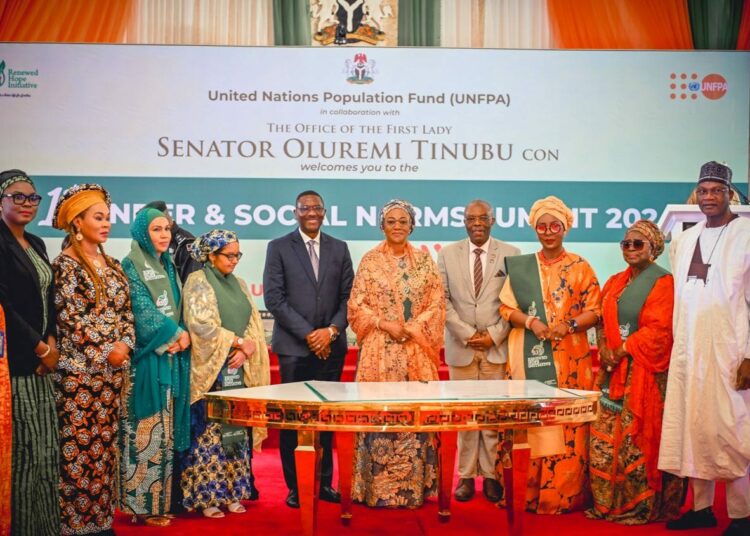From Juliana Taiwo-Obalonye, Abuja
Amid increasing public concerns over the safety of women and children, the First Lady, Mrs. Oluremi Tinubu, has signed an agreement with governors’ wives to combat Gender-Based Violence (GBV) and harmful social practices against women.
The agreement was signed yesterday in Abuja at the first ‘Gender and Social Norms Summit 2024,’ organised by the United Nations Population Fund (UNFPA) and the Renewed Hope initiative, in collaboration with the Office of the First Lady.
In her keynote address, the first lady said the prevalence of harmful practices such as female genital mutilation (FGM), assault on women, and child marriage, which in some cases lead to Vesicovaginal Fistula (VVF), has remained unacceptably high.
According to her, incidences of such practices have continued to increase in spite of various efforts.
She also said that recently, the spate of rape cases and GBV had reached an alarming rate, with babies even falling victims too.
“Do we allow this trend to continue, or do we look the other way? That is why I am calling on the law enforcement agencies, the Inspector-General of Police, the Attorney-General of the Federation and the National Assembly (NASS) to appropriate and enforce stiffer laws and punishments for perpetrators of rape, sexual violence and other forms of GBV. No guilty party should be allowed to go free and start running the streets looking for the next victim,” she said.
Mrs Tinubu, however, said that collective action was needed to put an end to the practices.
She advocated for the development of state-specific action plans to promote the allocation of adequate resources in the government’s budgets to support gender equality initiatives and GBV prevention programmes.
She added: “This summit provides us with a common platform to create awareness, exchange lessons learned and promote effective strategies for preventing and responding to GBV and harmful practices.”
The UNFPA Officer-In-Charge, Mr Koessan Kuawu, said family planning is not only a crucial health intervention but also a cornerstone of gender equality and women empowerment.
He, however, noted that social norms drive misconceptions and cultural barriers in many communities across the country, hindering the uptake of family planning.
According to him, Nigeria occupies a unique position globally in the pursuit of the Sustainable Development Goals (SDGs) for 2030, due to its vast population.
He commended the Federal Government “for its steadfast dedication to creating an enabling environment, through the passage and enforcement of critical legislations, such as the Violence Against Persons Prohibition (VAPP) Act 2015.
“The implementation of the national FGM policy, the national child marriage policy, and state-specific action plans are also highly commendable to eliminate the menace.
“These milestones have been achieved through persistent advocacy, aimed at strengthening the adoption and implementation of these laws.”
He explained that though eliminating GBV and harmful social practices is an immense task, it is not insurmountable.
“With the right resources, political will and community support across the states, we can change the narrative for women and girls in Nigeria,” Kuawu said.
On her part, Minister of Women Affairs and Social Development, Mrs. Uju Ohanneye, advocated stricter penalties for perpetrators.
She explained that “overseas, people are afraid to commit crimes or things that can harm another because when you do it, you face the consequences, legally and otherwise.”
She reiterated the commitment of the ministry to support and implement programmes towards eliminating GBV.
The Attorney-General of the Federation, Lateef Fagbemi (SAN), defined social norms as unspoken rules or expected behaviours that set social standards of appropriate and inappropriate manners in a specific culture or social group.
Fagbemi, who was represented by the Solicitor-General of the Federation, Mrs Beatrice Agba, said: “GBV encompasses various forms of violence directed at individuals based on their gender, often rooted in unequal power dynamics and societal norms.”
He, however, noted that the practices “may unfortunately be attributed to the patriarchal and male dominance theoretical framework in place in our society.”
He said the Federal Ministry of Justice was fully aware of the crucial roles that the justice system plays in addressing gender and social norms through the provision of a framework for accountability, protection and empowerment.
He added that by upholding the rule of law, promoting gender equality and advancing justice for all, the justice system could contribute significantly to creating a more inclusive, equitable and just society for the present and future generations.
Also, in addition to ongoing legislative reforms, the ministry was working with critical stakeholders to engage community actors such as traditional rulers, faith-based organisations, and informal community justice systems to address the notions and institutions that perpetrate violence against women and girls.
“We are initiating a pilot phase with the area councils in collaboration with area council chairmen to support ongoing dialogues and initiatives on this subject,” he said.
Emir of Shonga, Haliru Yahaya, emphasised the importance of engaging traditional leaders in community programmes aimed at combating gender-based violence (GBV) and harmful practices. He noted that without the support of local leaders, initiatives may fail to resonate with the community.
Yahaya highlighted the challenges posed by practices such as FGM and early marriage, regretting that the gains made in tackling the menace was erased by the COVID-19 pandemic and ongoing poverty.
He praised the efforts of the First Lady and the Women Affairs Ministry in addressing these issues and urged stakeholders to work closely with traditional leaders to ensure they are informed and supportive of initiatives aimed at protecting women and girls.
Yahaya stressed that understanding and enlightening these leaders was crucial for the success of any programme, as they play a pivotal role in shaping community attitudes.
He reaffirmed the need for a collaborative approach to empower women, stating that neglecting their contributions would hinder national progress.
In attendance were the wives of state governors, state Commissioners of Women Affairs and Health, Ministers of Women Affairs, youths, traditional rulers and other stakeholders.
